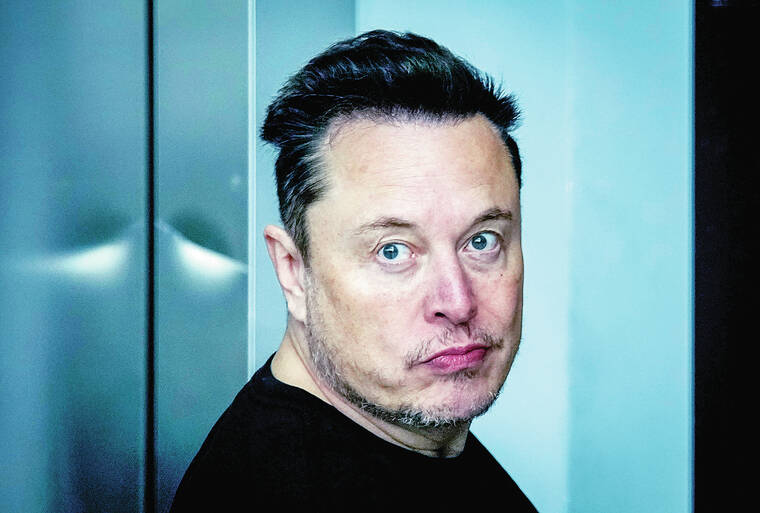Tesla asks shareholders to restore $56B Elon Musk pay package that was voided by Delaware judge
DETROIT — Tesla is asking shareholders to restore a $56 billion pay package for CEO Elon Musk that was rejected by a Delaware judge this year, and to shift the company’s corporate home to Texas.
The changes, to be voted on by stockholders at a June 13 annual meeting, could be a tougher sell than when it was first approved in 2018. The Austin, Texas, electric vehicle maker is struggling with falling global sales, slowing electric vehicle demand, an aging model lineup and a stock price that has tumbled 37% so far this year.
ADVERTISING
In January, Chancellor Kathaleen St. Jude McCormick ruled that Musk is not entitled to the landmark stock compensation that was to be granted over 10 years.
Ruling on a lawsuit from a shareholder, she voided the pay package, saying that Musk essentially controlled the board, making the process of enacting the compensation unfair to stakeholders. “Musk had extensive ties with the persons tasked with negotiating on Tesla’s behalf,” she wrote in her ruling.
But in a letter to shareholders released in a regulatory filing on Wednesday, Chairperson Robyn Denholm said that Musk has delivered on the growth it was looking for at the automaker, with Tesla meeting all of the stock value and operational targets in the 2018 package that was approved by shareholders. Shares are up 571% since the pay package began.
“Because the Delaware Court second-guessed your decision, Elon has not been paid for any of his work for Tesla for the past six years that has helped to generate significant growth and stockholder value,” Denholm wrote. “That strikes us — and the many stockholders from whom we already have heard — as fundamentally unfair, and inconsistent with the will of the stockholders who voted for it.”
In the filing, Tesla said it intends to appeal the decision. If shareholders approve the new package, disclosure and procedural deficiencies and breaches of the board’s fiduciary duty detailed by McCormick should be fixed, the filing said.
But Tesla said shareholders may still challenge the ratification vote. Even if it does pass, Tesla said it may not fully resolve the matter and a Delaware court could find the ratification itself is not fair to shareholders.
If shareholders don’t ratify the plan, Tesla said it may need to negotiate a replacement with Musk. That may take a lot of time and expense “in light of the criticism” detailed in the Delaware suit.
Tesla is going the route of ratification, instead of trying to negotiate a new package with Musk, which the company said would likely need to be of similar magnitude to the previous package in order to keep him.
Because it’s trying for ratification instead of a new plan, Tesla said it “did not substantively re-evaluate the amount or term” of the package and did not hire another compensation consultant to weigh in on it.
In the 2018 plan, Musk would not get salary or cash bonuses. Instead he was to receive only stock options, and only if the company met certain thresholds. It would need to grow its total market value by certain amounts, while also hitting targets for revenue and pretax earnings, and other items.
Many CEOs at big companies need to hit targets to get a lot of their possible compensation. That’s to encourage decisions that benefit the company and shareholders at large. But Musk was unusual in having all of his pay dependent on such measures.
When the company’s board drew up the compensation plan, it said it thought the hurdles would be challenging to meet. Some outsiders agreed.





